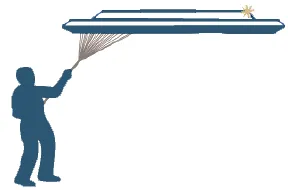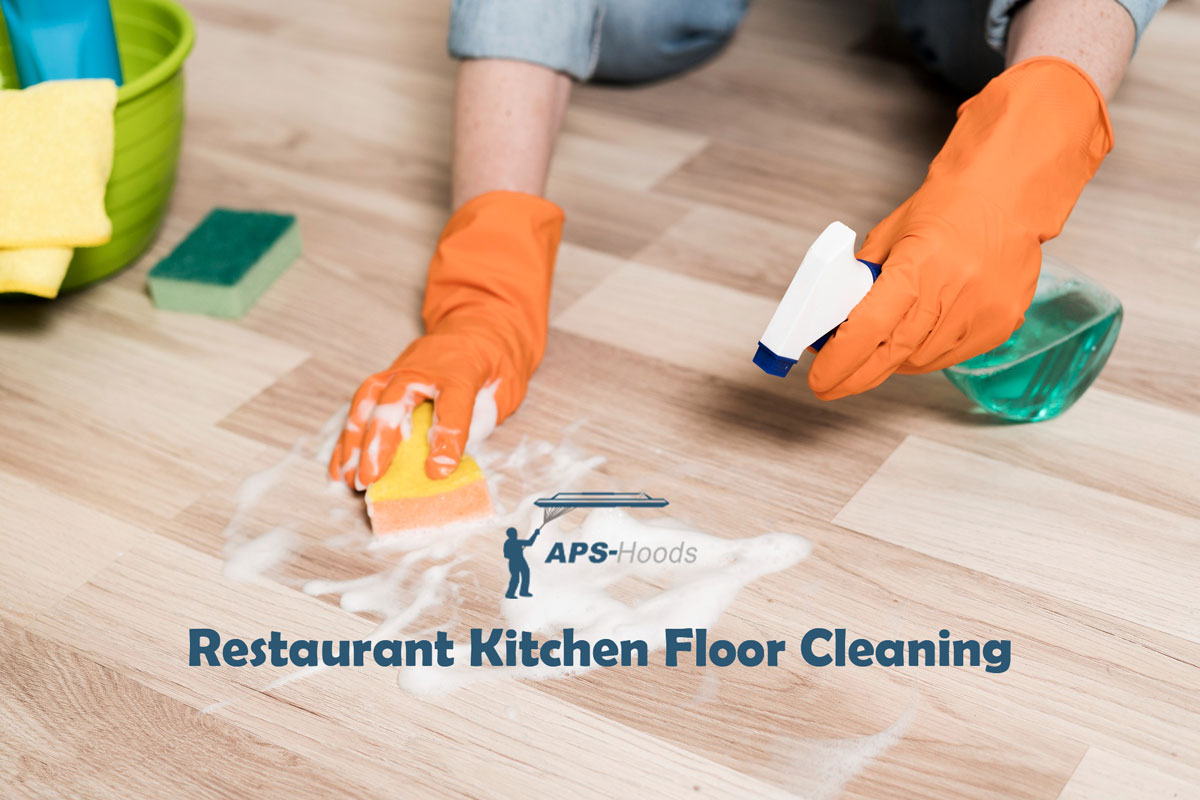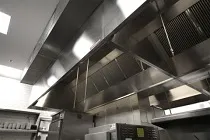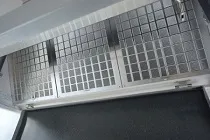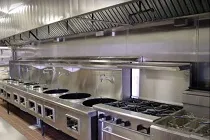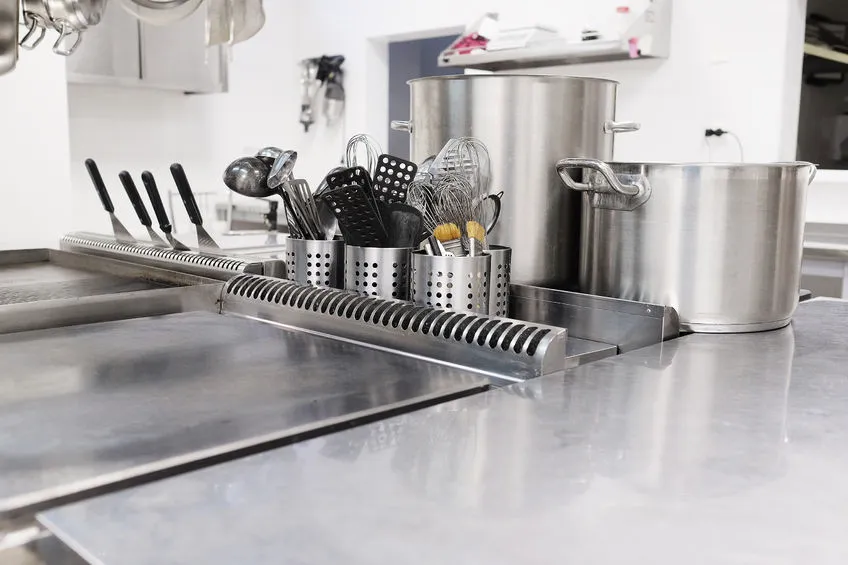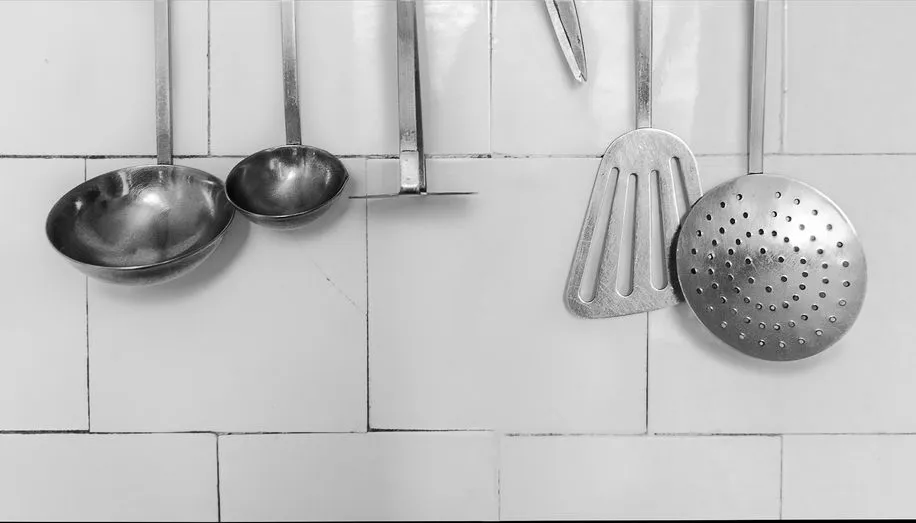Commercial kitchens are high-risk environments that require regular and thorough cleaning to ensure safety, hygiene, and productivity. One of the most crucial aspects of commercial kitchen cleaning is floor care, as it can prevent slips and falls, reduce wear and tear, and enhance the appearance of the kitchen. However, commercial kitchen floor cleaning is not a simple task. It is a whole different ball game, and it requires more than just the basics of a mop, a bucket, and some detergent. They are not enough to make your commercial kitchen floor sparkle every day. You need more than that to tackle the dirt and fight off the grime. Commercial floor cleaning involves various steps, techniques, and chemicals that need to be applied correctly and efficiently. In this article, we will explain the best practices and tips for floor cleaning, based on the experience and expertise of professional cleaners.
Don't risk putting up with a dirty kitchen floor. Trust APS-HOODS to make it sparkle again. We have what it takes to clean any floor, any time. Contact us now for a free quote and a consultation in Denver, Co.
Dirty Kitchen Floor and Its Impacts on Bottom Line and Customer's Satisfaction
When grease, spills, dirt, and debris accumulate on your kitchen floor, they create a filthy and hazardous environment that jeopardizes your business and your customers. A dirty kitchen floor can have multiple negative consequences, such as:
- It can trigger accidents and injuries like falls and slips, which can lead to lawsuits, injuries, and insurance claims;
- It might your floor, which can shorten its durability, raise its upkeep expenses, and diminish its beauty;
- It may become a breeding ground for germs, bugs, and rodents, which can infect your food, tools, and appliances, and result in outbreaks and fines;
- It can tarnish your image, which can drive away customers from your restaurant, lower their retention and happiness, and damage your standing and scores.
Challenges of Floor Cleaning in a Commercial Kitchen
Demanding and busy environments like restaurant kitchens require high standards of cleanliness and hygiene. However, cleaning a restaurant kitchen floor can pose many challenges, such as preventing slipping hazards and cross-contamination as well as removing grease, food spills, dirt, and bacteria. These challenges can affect the quality of service, the safety of staff and customers, and the reputation of the business.
Tips to Overcome the Challenges of Floor Cleaning
- Sweep the floor regularly to get rid of loose dirt and stop it from building up on the surface;
- Apply and spread a chemical degreaser that works for your floor type by following the instructions. Then leave it for a few minutes to loosen the oil and grease;
- Mop the floor in parts, beginning from the corner that is farthest and moving to the door. Also, wash the mop often and replace the water when necessary;
- Use a hard-bristled brush or a floor-scrubbing machine to get rid of the tough dirt and grease. Also, don't forget the corners, edges, and grout lines where dirt can pile up;
- To remove all the degreaser residue and dirt, Rinse the floor thoroughly with clean water. Moreover, you need to use a floor squeegee or a wet/dry vacuum to remove the excess water and also prevent slipping;
- Wait until the floor is totally dry before letting people walk on it or moving any equipment back to the place. You can also use fans or blowers to make the drying process faster;
- Also, sanitize the floor with a food-safe solution to eliminate any harmful microbes;
- Keep a cleaning routine and train your staff how to clean the floor well. You can also use a checklist to make sure all the steps are followed and recorded.
A Checklist Of The Necessary Items in Kitchen Floor Cleaning
Despite some drawbacks, a few restaurant owners attempt to cut corners by delegating floor cleaning to their kitchen staff. However, this practice often backfires, as we frequently encounter situations where we have to rectify the poor cleaning done by inexperienced staff. Moreover, the unhygienic conditions pose serious risks to the health and safety of both staff and customers. However, if you prefer to undertake this arduous and demanding task on your own, the following items are essential:
- Broom and dustpan or vacuum cleaner: to remove loose dirt and debris
- Mop and bucket: to wet the floor and remove grime and stains
- Floor cleaner, sanitizer, or a vinegar solution: to disinfect and deodorize the floor
- Gloves and protective gear: to ensure your safety and health, and reduce the risk of rashes, burns, allergies, or poisoning
- Floor squeegee or a wet/dry vacuum: to dry the floor, remove excess water and prevent slipping hazards
- Wet floor signs: to place them around and to warn others of the slippery surface
- Microfiber cloth or a paper towel: to wipe down the baseboards and the corners
However, by hiring floor cleaning services, you can benefit from the newest floor steam cleaner and pressure washer surface cleaner, and the quickest and most effective technologies in floor cleaning.
Why burn yourself out on a task that is beyond your skills and tools? Let our experts at APS-HOODS handle your kitchen floor cleaning. Contact us for a free quote and quality assurance.
Floor Cleaning and Maintaining For Different Types of Floors
Commercial kitchens have various types of floors, such as tile, concrete, vinyl, or rubber. Each type of floor exhibits distinct features and requires specific cleaning methods. The following parts show how to clean various kinds of floors in commercial kitchens.
Quarry Tile Floor
By maintaining these tiles properly, you can preserve their aesthetic, structural, and anti-slip properties as well as their durability. Use a neutral cleaner and hot water that you replace frequently for daily sweeping and wet mopping. Scrub the tile floor with a deck brush, hot water, and a neutral cleaner every week. Then, rinse the floor and squeeze the excess water into a drain. Also, if you need to use a degreaser, follow the manufacturer’s instructions.
Seamless Epoxy / Urethan Floor
Epoxy flooring requires careful cleaning. Vacuum any dirt or grit that could scratch the floors. Do not drag items on the floor to prevent scratches. Use a damp cloth and warm water to clean the floor after removing the dirt and sand. Do not use soap-based cleaners. Citrus cleaners or vinegar can also damage the epoxy catalyst, so do not use them to clean the floor. For a very dirty floor, use water and ammonia to clean it. Ammonia cleaners can be dangerous, so use them with caution.
Stained Concrete Floor
Use only neutral cleaners to clean stained concrete. Do not use ammonia, citrus, bleach, or vinegar, which are harsh cleaning products. To prevent scratches on the stained concrete floor, dust or vacuum the dirt and grit with a shop vacuum. Clean up kitchen spills as soon as possible. Do not use chemical degreasers and stain removers on stained concrete. Harsh chemicals can damage the sealer that you walk on, and sometimes strip it off after one use. Make sure the cleaner and seal are compatible.
Vinyl Floor
Vinyl floors are sometimes soft and prone to scratches and dents. So, be careful when cleaning these floors with heavy equipment. Sweep or vacuum the dirt and grit that can damage the floor. Use a soft-bristled broom or a washcloth without oil. Clean the floor with neutral cleaners. Replace the water often or drain the dirty water and use clean water. For tough stains, you can try stronger chemicals, but follow what the manufacturer says. Do not rub on the seams.
Rubber Floor
To clean rubber floors, sweep or vacuum the dirt and dust that can damage them. Mop with warm water and mild soap or neutral cleaner and avoid using cleaning agents that might degrade your rubber floor which are highly acidic or alkaline. Then rinse it well and air-dry. Do not use a cloth or towel, as they can leave lint or fibers. For oil or grease stains, use a rubber-friendly degreaser or solvent. To keep the floors shiny and protected, apply a rubber conditioner or fabric softener once or twice a year. Follow the instructions and dry the floor before applying.
Hardwood Floor
Clean hardwood floors by sweeping or vacuuming the dirt and dust with a soft broom or vacuum. Mop with warm water and mild cleaner using a microfiber mop or cloth and Wring it out well. Avoid bleach, vinegar, ammonia, or turpentine, which can harm the wood. Rinse and dry the floor with clean water and a soft towel or cloth. Do not leave water on the floor. For oil or grease stains, use a hardwood-specific cleaner or solvent. Test it on a small area first and follow the instructions. To keep the floors shiny and protected, apply a polish or wax once or twice a year. Dry the floor before applying.
What Are The Best Kitchen Surface Cleaners for Floor Cleaning?
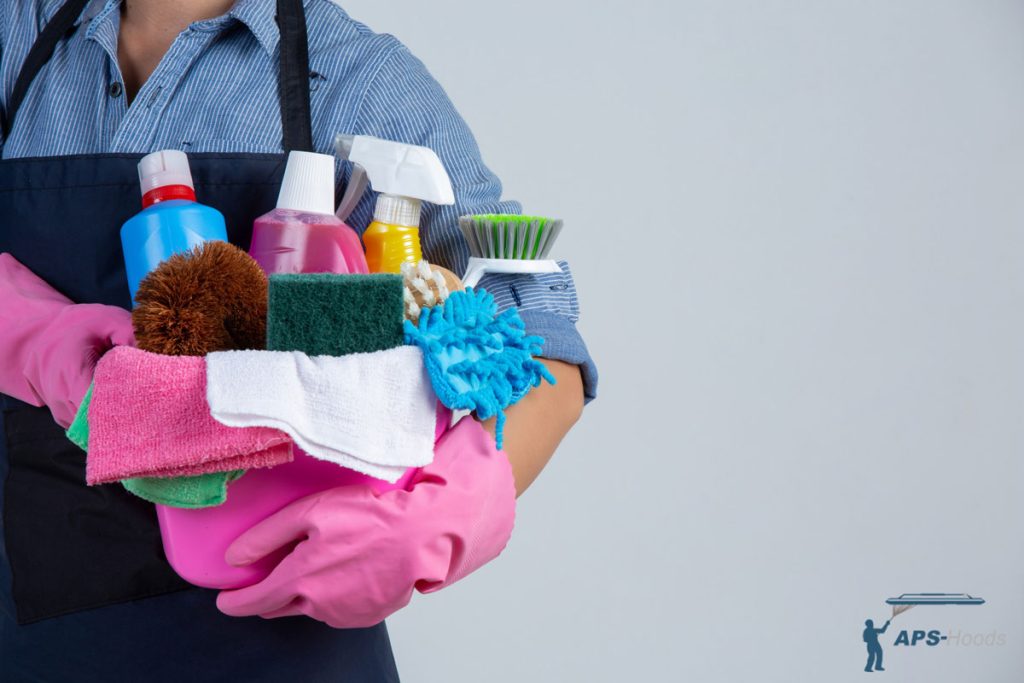
Acidic Cleaner
The best way to eliminate mineral deposits and stains from the floor, particularly on tile and grout, is to apply acidic cleaner on the floor and let it sit for a few minutes. Then, scrub the floor with a brush or a sponge and rinse it with clean water.
Alkaline Cleaner
A possible way to eliminate food residues and organic matter from the floor, particularly on concrete and vinyl, is to apply alkaline cleaner on the floor and let it sit for a few minutes. Then, scrub the floor with a brush or a sponge and rinse it with clean water.
Quaternary Ammonium Compound (QAC)
You can use QAC to sanitize the floor and eliminate bacteria and other microorganisms. Dilute QAC according to the manufacturer's instructions and apply it on the floor with a spray bottle or a bucket. Leave it for a few minutes to let it work. Then, wipe the floor with a clean cloth or let it air dry.
Neutral Cleaner
It’s a harmless and flexible cleaner that works on most kinds of floors, such as wood, laminate, vinyl, and linoleum. It does not create any deposit or layer on the floor.
Foaming Cleaner
It’s a strong and efficient cleaner that can help you get rid of grease and oil from the floor, especially on tile and ceramic. It does not harm the surface or the grout.
Plant-Based Cleaner
A cleaner that is natural and good for the environment that works on floors, countertops, walls, and other surfaces. It smells nice because of the oils from plants.
How Often Should Commercial Kitchen Floors Be Cleaned?
Depending on the kind and volume of spills and traffic, commercial kitchen floors need frequent and deep cleaning. A good rule is to clean the floors daily, ideally after the shift, when the kitchen has less activity and is easier to access. However, some parts may require more often cleaning, like:
- Areas near cooking appliances, such as stoves, griddles, ovens, and fryers, where grease and oil can scatter and spill;
- Areas adjacent to food processing stations, such as counters, cutting boards, and sinks, where food particles and juices can fall and drip;
- Areas adjacent to waste disposal stations, such as compost bins, trash cans, and drains, where food waste and liquids can seep and overflow.
These areas should be sanitized promptly after each use, or at least every few hours, to avoid the build-up of dirt and contamination. However, it is usually recommended to deep clean the floor in commercial kitchens bi-annually or quarterly to eliminate any dirt or deposits that may have accumulated over time.
FAQs About Kitchen Floor Cleaning Services
How long does it take cleaning services to clean the floor in commercial kitchens?
The length of time needed for the floor cleaning services for commercial kitchens varies based on different aspects, such as how big and dirty the kitchen floor is, how many cleaners are working, and what kind of cleaning tools and materials are used.
Do commercial restaurant kitchens have to shut down when the floor is being cleaned?
The kitchen may not need to close for daily or shift-based floor cleaning, as long as the cleaners avoid contaminating the food and bacteria, and do it when the kitchen is idle. For weekly or monthly floor cleaning, the kitchen may close for a few hours or a day, as the cleaners may need to move or unplug some machines, use heavy or special tools, and apply chemicals that take time to dry or wash. For deep cleaning or maintenance service, the kitchen may close for several days or more, as the cleaners may need to fix or change some parts of the kitchen, like the floor, the pipes, or the vents.
Is it possible to request cleaning services to only clean the floor or do they have to clean the whole kitchen?
In one-time or occasional services you can pick and pay for what to clean, like floor or kitchen parts. On the other hand, in recurring or regular cleaning services, there are fixed cleaning tasks every visit, weekly, biweekly, or monthly. But you may request some changes, if possible. In deep or maintenance services that provide a thorough cleaning of the entire kitchen, It may not be possible for you to ask them to clean just the floor or parts of the kitchen. Because they may have to follow a certain procedure to make sure the kitchen is safe and clean.
Hire Professional Kitchen Floor Cleaning to Boost Your Restaurant Business
Floor cleaning is a vital and integral part of running a commercial kitchen and it’s a challenging task that requires proper methods, tools, and chemicals. Furthermore, it can prevent accidents, bacteria-harboring, infections, and damage, and improve the appearance, performance, and reputation of your restaurant. However, hiring a professional service for floor cleaning can benefit your restaurant by saving money on staff, equipment, supplies, and taxes. Moreover, you can get hygienic and clean floors with the most suitable chemicals for your floor. In addition, you can prevent accidents, and infections and comply with damages and regulations. APS-HOODS, the top-rated kitchen floor cleaning company in Denver, CO, can transform your kitchen floor with our skills, tools, and methods. We promise you quality and safety. Contact us now at (800) 750-7313.
Contact Us
The business of a restaurant revolves around its kitchen. Having your commercial kitchen fully functional at all times is a prerequisite to keeping both your customers and your employees happy and safe. Through our professional kitchen equipment repair, cleaning, and installation services, we can help you keep your kitchen stations squeaky clean and well-maintained, year after year. If you plan to improve safety, avoid future disasters, and add more years to your commercial kitchen equipment and systems, we should definitely talk and work together.
